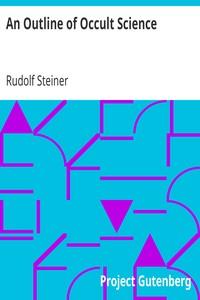Read this ebook for free! No credit card needed, absolutely nothing to pay.
Words: 115017 in 17 pages
This is an ebook sharing website. You can read the uploaded ebooks for free here. No credit cards needed, nothing to pay. If you want to own a digital copy of the ebook, or want to read offline with your favorite ebook-reader, then you can choose to buy and download the ebook.
PREFACE TO THE FOURTH EDITION.
One who undertakes to represent certain results of scientific spiritual research of the kind recorded in this book, must above all things be prepared to find that this kind of investigation is at the present time almost universally regarded as impossible. For things are related in the following pages about which those who are today esteemed exact thinkers, assert that they will probably remain altogether indeterminable by human intelligence. One who knows and can respect the reasons which prompt many a serious person to assert this impossibility, would fain make the attempt again and again to show what misunderstandings are really at the bottom of the belief that it is not given to human knowledge to penetrate into the superphysical worlds.
For two things present themselves for consideration. First, no human being will, on deeper reflection, be able in the long run to shut his eyes to the fact that his most important questions as to the meaning and significance of life must remain unanswered, if there be no access to higher worlds. Theoretically we may delude ourselves concerning this fact and so get away from it; the depths of our soul-life, however, will not tolerate such self-delusion. The person who will not listen to what comes from these depths of the soul will naturally reject any account of supersensible worlds. There are however people--and their number is not small--who find it impossible to remain deaf to the demands coming from the depths of the soul. They must always be knocking at the gates which, in the opinion of others, bar the way to what is "incomprehensible."
Human understanding, as it works in everyday life and in ordinary science, is actually so constituted that it cannot penetrate into superphysical worlds. This may be proven beyond the possibility of denial. But this proof can have no more value for a certain kind of soul-life than the proof one would use in showing that man's natural eye cannot, with its visual faculty, penetrate to the smallest cells of a living being, or to the constitution of far-off celestial bodies.
Just as the assertion is true and demonstrable that the ordinary power of seeing does not penetrate as far as the cells, so also is the other assertion which maintains that ordinary knowledge cannot penetrate into supersensible worlds. And yet the proof that the ordinary power of vision has to stop short of the cells in no way excludes the investigation of cells. Why should the proof that the ordinary power of cognition has to stop short of supersensible worlds, decide anything against the possibility of investigating those worlds?
Man's power of cognition may be augmented and made more powerful, just as the eye's power of vision may be augmented. Only the means for strengthening the capacity of cognition are entirely of a spiritual nature; they are inner processes, belonging purely to the soul. They consist of what is described in this book as meditation and concentration . Ordinary soul-life is bound up with the bodily instrument; the strengthened soul-life liberates itself from it. There are schools of thought at the present time to which this assertion must appear quite senseless, to which it must seem based only upon self-delusion. Those who think in this way will find it easy, from their point of view, to prove that "all soul-life" is bound up with the nervous system. One who holds the standpoint from which this book has been written, can thoroughly understand such proofs. He understands people who say that only superficiality can assert that there may be some kind of soul-life independent of the body, and who are quite convinced that in such experiences of the soul there exists a connection with the life of the nervous system, which the "dilettantism of occult science" merely fails to detect.
Here certain quite comprehensible habits of thought are in such sharp contradiction to what has been described in this book, that there is as yet no prospect of coming to an understanding with many people. It is here that we come to the point where the desire must arise that it should no longer be a characteristic of our present day culture to at once decry as fanciful or visionary a method of research which differs from its own. But on the other hand it is also a fact at the present time that a number of people can appreciate the supersensible method of research, as it is presented in this book, people who understand that the meaning of life is not revealed in general phrases about the soul, self, and so on, but can only result from really entering into the facts of superphysical research.
In conclusion, the author would like to observe that it would be well if even the sympathetic reader of the book would take its statements exactly as they stand. At the present time there is a very prevalent tendency to give this or that spiritual movement an historical name, and to many it is only such a name that seems to make it valuable. But, it may be asked, what would the statements in this book gain by being designated "Rosicrucian," or anything else of the kind? What is of importance is that in this book a glimpse into supersensible worlds is attempted with the means which in our present period of evolution are possible and suitable for the human soul; and that from this point of view the problems of human destiny and human existence are considered beyond the limits of birth and death. It is not a question of an endeavor which shall bear this or that old name, but of a striving after truth.
In placing a book such as this in the hands of the public, the writer must calmly anticipate every kind of criticism regarding his work which is likely to arise in the present day. A reader, for instance, whose opinions are based upon the results of scientific research, after noting certain statements made here touching these things, may pronounce the following judgment: "It is astounding that such statements should be possible in our time. The most elementary conceptions of natural science are distorted in such a manner as to denote positively inconceivable ignorance of even the rudiments of science. The author uses such terms, for instance, as 'heat' in a way that would lead one to infer that he had let the entire wave of modern thought on the subject of physics sweep past him unperceived. Any one familiar with the mere elements of this science would show him that not even the merest dilettante could have made these statements, and they can only be dismissed as the outcome of rank ignorance."
This and many a similar verdict might be pronounced, and we can picture our reader, after the perusal of a page or two, laying the book aside,--smiling or indignant, according to his temperament,--and reflecting on the singular growths which a perverse tendency of thought may put forth in our time. So thinking, he will lay this volume aside, with his collection of similar freaks of the brain. What, however, would the author say should such opinions come to his knowledge? Would he not, from his point of view, also set the critic down as incapable of judgment or, at least, as one who has not chosen to bring his good will to bear in forming an intelligent opinion? To this the answer is most emphatically--No! In no sense whatever does the author feel this, for he can easily conceive of his critic as being not only a highly intelligent man, but also a trained scientist, and one whose opinions are the result of conscientious thought. The author of this book is able to enter into the feelings of such a person and to understand the reasons which have led him to form these conclusions.
Now, in order to comprehend what the author really means, it is necessary to do here what generally seems to him to be out of place, but for which there is urgent cause in the case of this book, namely, to introduce certain personal data. Of course, nothing will be said in this connection but what bears upon the author's decision to write this book. What is said in it could not be justified if it bore merely a personal character. A book of this kind is bound to proffer views to which any person may attain, and these views must be presented in such a way as to suggest no shade of the personal element, that is, as far as such a thing is possible.
It is therefore not in this sense that the personal note is sounded. It is only intended to explain how it was possible for the author to understand the above characterized opinions concerning his presentations, and yet was able to write this book.
Free books android app tbrJar TBR JAR Read Free books online gutenberg
More posts by @FreeBooks


: Where There's Hope by Bixby Jerome Freas Kelly Illustrator - Science fiction; Short stories Science Fiction









